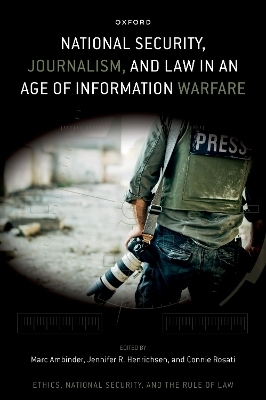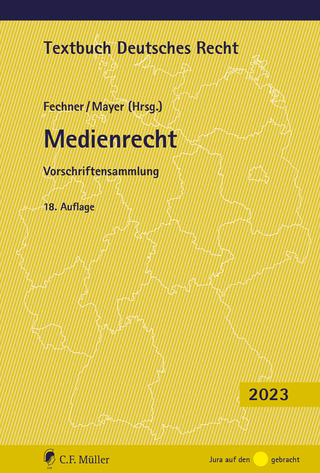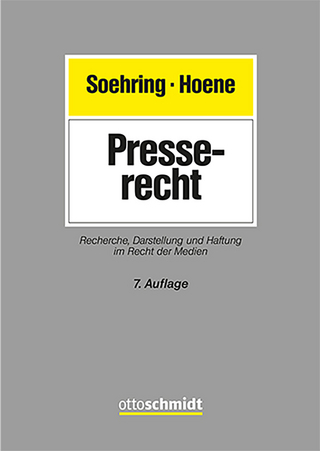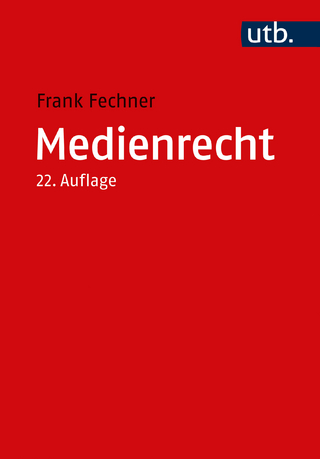
National Security, Journalism, and Law in an Age of Information Warfare
Oxford University Press Inc (Verlag)
978-0-19-775662-1 (ISBN)
National security reporting has long involved tension between governmental efforts to protect against threats to our collective well-being, and journalism's efforts to inform the public and hold state actors to account. Attempts to balance the needs and duties of government and journalism are increasingly challenged by pervasive misinformation and disinformation, the rise of alternative “news” sources, distrust of traditional media and government, and both legal challenges to and external threats against journalists.
National Security, Journalism, and Law in an Age of Information Warfare describes the professional and ethical challenges faced by journalists covering national security, lawyers litigating national security issues, and government institutions entrusted with protected secrets in a context of information disorder. This book helps one to understand how secret-keepers, journalists, and sources are navigating unprecedented challenges in an age when trust in institutions is low and the spread of disinformation through social media undermines efforts to inform and protect the public. The volume explores the rise of deception and disinformation, new clashes over executive power and national security, and changing norms of privacy and transparency in the age of social media.
This collection of indispensable essays provides an array of perspectives on difficult problems and provides illuminating answers that can help government and journalism develop better policies and practices.
Marc Ambinder is a misinformation policy lead at TikTok, and an adjunct professor of journalism at the University of Southern California's Annenberg School of Communications and Journalism, where he teaches investigative, national security, and political reporting. He is the author of three books on national security and a former White House correspondent and has spent more than 15 years in the trenches of print, digital, broadcasting, and magazine journalism. In 2017, he was a fellow at the Center for Ethics and the Rule of Law at the University of Pennsylvania Law School. He was recently awarded an N Square Fellowship from the Ploughshares Fund to work on innovative ways to communicate about the threat posed by nuclear weapons. Jennifer R. Henrichsen is an Assistant Professor at the Edward R. Murrow College of Communication at Washington State University. She is also an Affiliated Fellow at the Information Society Project at Yale Law School and an Affiliated Fellow at the University of Pennsylvania and Rutgers University's joint Media, Inequality, and Change Center. Dr. Henrichsen received her Ph.D. from the Annenberg School for Communication at the University of Pennsylvania. Dr. Henrichsen's research examines how adversaries exploit weaknesses in the spread of information across organizations and institutions to contaminate the information ecosystem and to erode trust in knowledge systems. Specifically, she assesses how these and other challenges - from state and corporate surveillance to physical and digital attacks against the media - are creating an epistemic crisis for journalism. Dr. Henrichsen's research has been published in top peer-reviewed journals, including Digital Journalism, the International Journal of Communication, Journalism Practice, Journalism Studies, Communication, Culture & Critique, New Media & Society, and Media, War & Conflict. She twice has been a consultant to UNESCO where she produced global reports on the state of journalism and she has served as a consultant to the Knight Foundation, the MacArthur Foundation, and the Ford Foundation. She has served on the Advisory Council for the Open Technology Fund and the Steering Committee for the Center for Media at Risk at Annenberg. Dr. Henrichsen has written articles about journalism and information security for Columbia Journalism Review and Poynter and she was previously a freelance journalist and a political correspondent. Dr. Henrichsen has received fellowships from Yale, Columbia University, the University of Fribourg, the Knight Foundation and First Look Media. A Fulbright Research Scholar, Dr. Henrichsen holds MA degrees from the University of Geneva and the University of Pennsylvania. In 2011, she co-wrote the book, War on Words: Who Should Protect Journalists? (Praeger) and in 2017 she co-edited the book, Journalism After Snowden: The Future of the Free Press in a Surveillance State (Columbia University Press). Connie S. Rosati is Roy Allison Vaughan Centennial Professor in Philosophy and Professor of Law at the University of Texas at Austin. She received a Ph.D. in Philosophy in 1989 from the University of Michigan and J.D. in 1998 from Harvard Law School. She has previously held positions at Rutgers University, Northwestern University, the University of California, Davis, and the University of Arizona, as well as visiting positions at the University of San Diego Law School, Arizona State University Law School, and the University of Pennsylvania Law School. Her research interests lie principally in moral philosophy and the foundations of ethics and in the nature and interpretation of constitutions. Recent publications include "Welfare and Rational Fit," "The Makropulos Case Revisited: Reflections on Immortality and Agency," "Constitutional Realism" and "The Moral Reading of Constitutions."
FOREWORD: Gordon Stables
EDITORS' INTRODUCTION: Marc Ambinder, Jennifer R. Henrichsen, and Connie Rosati
PART I: Rights and Duties of Journalists and News Organizations
1 Frederick Schauer, "On Obtaining National Security Information"
2 Matthew L. Schafer, "National Security and Access, a Structural Perspective"
3 Hannah Bloch-Wehba, "A Fourth Amendment Press Clause"
4 Marc Ambinder, "Higher Restraint: National Security Reporting in An Age of Information Anarchy"
5 Allison Puccioni, "Open Source Imagery Intelligence: Security Implications in an Era of Unprecedented Access to Satellite Data"
PART II: Government Push-Back and Governmental Duties to Journalists and News Organizations
6 George W. Croner, "The Government Pushes Back: Prosecuting Julian Assange in the War Against Leaks - Trend or Aberration?"
7 Deborah L. Dwyer, "Watchdogs in the Digital Age: Digital surveillance, information security, and the evolution of journalist-confidential source relationships"
8 Barry J. Pollack and Brian J. Fleming, "Charging Journalists Under the Espionage Act: Have We Reached a Tipping Point?"
9 David R. Carroll, "Using UK law to investigate misuse of data during the 2016 US Election: Cambridge Analytica and the Internationalization of Voter Analytics"
10 Jennifer R. Henrichsen, "Digital Shackles: The Political Economy of Surveillance Technologies and the Emergence of Transnational Surveillance Fascism"
11 Jennifer R. Henrichsen, Hannah Bloch-Wehba, Gabe Rottman, Grayson Clary, and Emily Hockett, "Digital Surveillance and Its Impact on Media Freedom: Navigating the Legal Landscape"
PART III: National Security, Journalism, and the Digital Media Ecosystem
12 Christopher J. Fuller, "Enemies Foreign and Domestic: America's Media Ecosystem and the Externalization of Domestic Threats"
13 Susan E. McGregor, "Securing the Digital Media Ecosystem"
14 Courtney C. Radsch, "On the Frontlines of the Information Wars: How Algorithmic Gatekeepers and National Security Impact Journalism"
15 Susan Moeller, "Weaponizing Images"
| Erscheinungsdatum | 26.09.2024 |
|---|---|
| Reihe/Serie | Ethics, National Security, and the Rule of Law |
| Verlagsort | New York |
| Sprache | englisch |
| Maße | 157 x 224 mm |
| Gewicht | 680 g |
| Themenwelt | Recht / Steuern ► EU / Internationales Recht |
| Recht / Steuern ► Privatrecht / Bürgerliches Recht ► Medienrecht | |
| Recht / Steuern ► Strafrecht ► Besonderes Strafrecht | |
| Sozialwissenschaften ► Kommunikation / Medien ► Journalistik | |
| ISBN-10 | 0-19-775662-X / 019775662X |
| ISBN-13 | 978-0-19-775662-1 / 9780197756621 |
| Zustand | Neuware |
| Haben Sie eine Frage zum Produkt? |
aus dem Bereich


